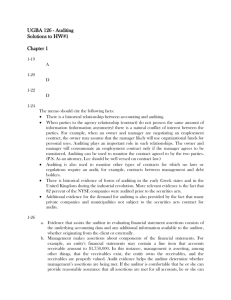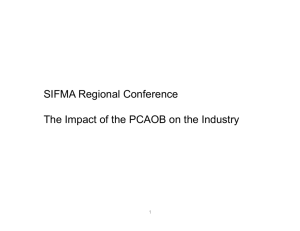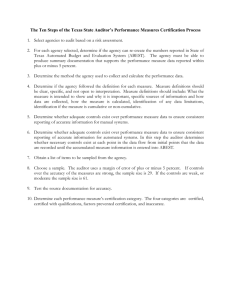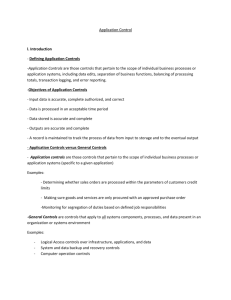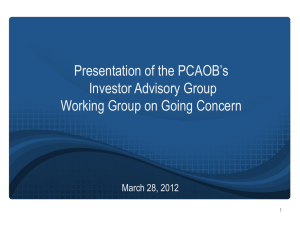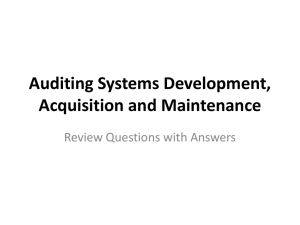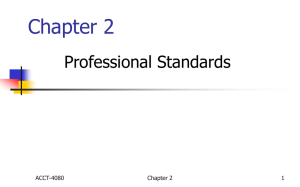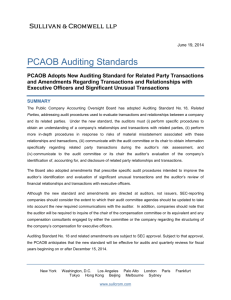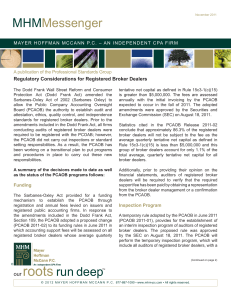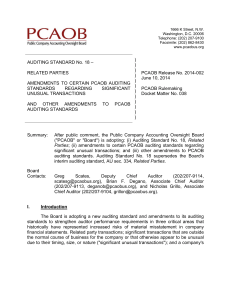PCAOB Adopts Auditing Standard and Amendments to Increase
advertisement
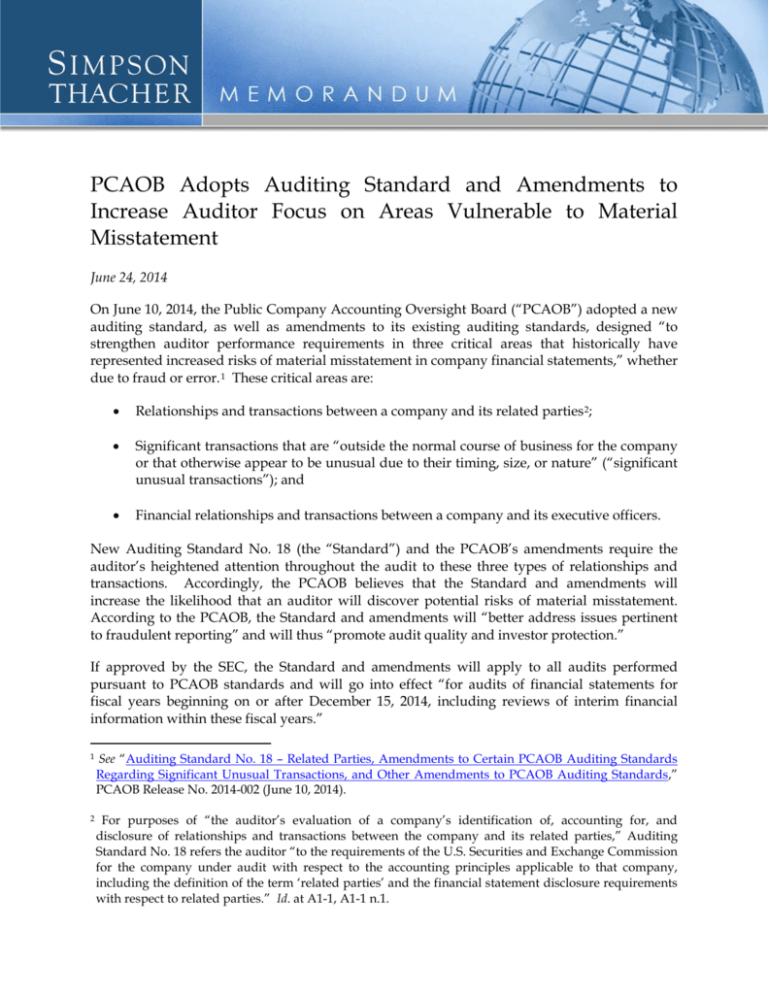
PCAOB Adopts Auditing Standard and Amendments to Increase Auditor Focus on Areas Vulnerable to Material Misstatement June 24, 2014 On June 10, 2014, the Public Company Accounting Oversight Board (“PCAOB”) adopted a new auditing standard, as well as amendments to its existing auditing standards, designed “to strengthen auditor performance requirements in three critical areas that historically have represented increased risks of material misstatement in company financial statements,” whether due to fraud or error. 1 These critical areas are: • Relationships and transactions between a company and its related parties 2; • Significant transactions that are “outside the normal course of business for the company or that otherwise appear to be unusual due to their timing, size, or nature” (“significant unusual transactions”); and • Financial relationships and transactions between a company and its executive officers. New Auditing Standard No. 18 (the “Standard”) and the PCAOB’s amendments require the auditor’s heightened attention throughout the audit to these three types of relationships and transactions. Accordingly, the PCAOB believes that the Standard and amendments will increase the likelihood that an auditor will discover potential risks of material misstatement. According to the PCAOB, the Standard and amendments will “better address issues pertinent to fraudulent reporting” and will thus “promote audit quality and investor protection.” If approved by the SEC, the Standard and amendments will apply to all audits performed pursuant to PCAOB standards and will go into effect “for audits of financial statements for fiscal years beginning on or after December 15, 2014, including reviews of interim financial information within these fiscal years.” 1 See “Auditing Standard No. 18 – Related Parties, Amendments to Certain PCAOB Auditing Standards Regarding Significant Unusual Transactions, and Other Amendments to PCAOB Auditing Standards,” PCAOB Release No. 2014-002 (June 10, 2014). 2 For purposes of “the auditor’s evaluation of a company’s identification of, accounting for, and disclosure of relationships and transactions between the company and its related parties,” Auditing Standard No. 18 refers the auditor “to the requirements of the U.S. Securities and Exchange Commission for the company under audit with respect to the accounting principles applicable to that company, including the definition of the term ‘related parties’ and the financial statement disclosure requirements with respect to related parties.” Id. at A1-1, A1-1 n.1. Memorandum – June 24, 2014 I. RELATIONSHIPS AND TRANSACTIONS WITH RELATED PARTIES: AUDITING STANDARD NO. 18 Auditing Standard No. 18 is intended “to strengthen auditor performance requirements by setting forth specific procedures for the auditor’s evaluation of a company’s identification of, accounting for, and disclosure of relationships and transactions with its related parties.” According to the PCAOB, the Standard enhances the existing requirements for auditing relationships and transactions with related parties (found primarily in AU sec. 334) and requires the auditor to perform certain specific procedures, including: • specific procedures to “obtain an understanding of the company’s relationships and transactions with its related parties, including an understanding of the nature of the relationships between the company and its related parties and of the terms and business purposes (or lack thereof) of transactions involving related parties”; • specific procedures to evaluate the “accuracy and completeness” of management’s identification of related parties; • specific procedures to investigate information indicating the existence of undisclosed relationships or transactions with a related party (and additional procedures upon confirming the existence of previously undisclosed relationships or transactions); and • specific procedures “regarding each related party transaction that is either required to be disclosed in the financial statements or determined to be a significant risk.” The Standard also requires the auditor to provide the company’s audit committee with “the auditor’s evaluation of the company’s identification of, accounting for, and disclosure of its relationships and transactions with related parties,” as well as other significant related issues arising from the audit. II. SIGNIFICANT UNUSUAL TRANSACTIONS The PCAOB adopted amendments to AU sec. 316 and other existing auditing standards in order to strengthen auditing requirements for identifying and evaluating significant unusual transactions. These amendments primarily require the auditor to perform specific procedures to identify significant unusual transactions and to understand and evaluate “the business purpose (or lack thereof) of identified significant unusual transactions.” The amendments also offer additional “factors for the auditor to consider in evaluating whether significant unusual transactions may have been entered into to engage in fraudulent financial reporting or conceal misappropriation of assets.” Page 2 Memorandum – June 24, 2014 III. FINANCIAL OFFICERS RELATIONSHIPS AND TRANSACTIONS WITH EXECUTIVE The PCAOB adopted amendments adding required procedures to the auditor’s risk assessment that are aimed at providing the auditor an understanding of the company’s financial relationships and transactions with its executive officers. According to the PCAOB, these new procedures “are intended to heighten the auditor’s attention to incentives or pressures for the company to achieve a particular financial position or operating result, recognizing the key role that a company’s executive officers may play in the company’s accounting decisions or in a company’s financial reporting.” 3 IV. PRACTICE POINTERS FOR PUBLIC COMPANIES • The Standard and the amendments regarding financial relationships and transactions with executive officers serve as a good reminder of the importance of a properly drafted policy on related party transactions. Given the PCAOB’s new and amended standards, now may be an opportune time for companies to revisit their policies to ensure that they are current and robust. • The amendments requiring auditors’ increased attention to significant unusual transactions highlight the importance of involving auditors early on with regard to such transactions, as well as, more generally, building and maintaining an open and transparent relationship with the auditors, so as to develop mutual trust. * * * If you have any questions or would like additional information, please do not hesitate to contact Yafit Cohn at (212) 455-3815 or yafit.cohn@stblaw.com, or any other member of the Firm’s Public Company Advisory Practice. This memorandum is for general information purposes and should not be regarded as legal advice. Please contact your relationship partner if we can be of assistance regarding these important developments. The names and office locations of all of our partners, as well as our recent memoranda, can be obtained from our website, www.simpsonthacher.com. The contents of this publication are for informational purposes only. Neither this publication nor the lawyers who authored it are rendering legal or other professional advice or opinions on specific facts or matters, nor does the distribution of this publication to any person constitute the establishment of an attorney-client relationship. Simpson Thacher & Bartlett LLP assumes no liability in connection with the use of this publication. 3 The new procedures do not require the auditor to assess the appropriateness of executive compensation arrangements. Page 3 Memorandum – June 24, 2014 UNITED STATES New York 425 Lexington Avenue New York, NY 10017-3954 +1-212-455-2000 Los Angeles 1999 Avenue of the Stars Los Angeles, CA 90067 +1-310-407-7500 Palo Alto 2475 Hanover Street Palo Alto, CA 94304 +1-650-251-5000 Washington, D.C. 1155 F Street, N.W. Washington, D.C. 20004 +1-202-636-5500 Houston 2 Houston Center ASIA Beijing 3919 China World Tower One 1 Jian Guo Men Wai Avenue Beijing 100004 China +86-10-5965-2999 Hong Kong ICBC Tower 3 Garden Road, Central Hong Kong +852-2514-7600 Seoul West Tower, Mirae Asset Center 1 26 Eulji-ro 5-gil, Jung-gu Seoul 100-210 Korea +82-2-6030-3800 Tokyo Ark Hills Sengokuyama Mori Tower 909 Fannin Street Houston, TX 77010 +1-713-821-5650 9-10, Roppongi 1-Chome Minato-Ku, Tokyo 106-0032 Japan +81-3-5562-6200 EUROPE SOUTH AMERICA London São Paulo CityPoint One Ropemaker Street London EC2Y 9HU England +44-(0)20-7275-6500 Av. Presidente Juscelino Kubitschek, 1455 São Paulo, SP 04543-011 Brazil +55-11-3546-1000 www.simpsonthacher.com
